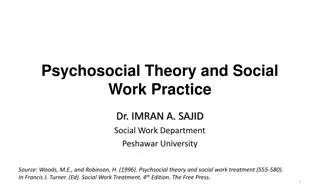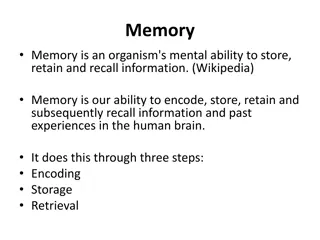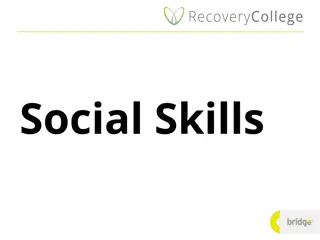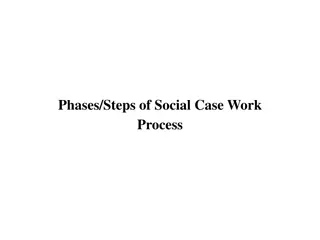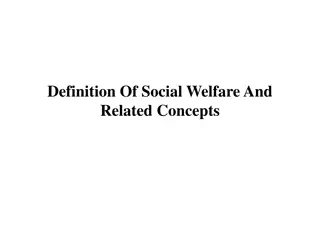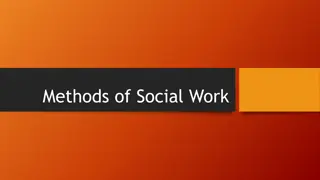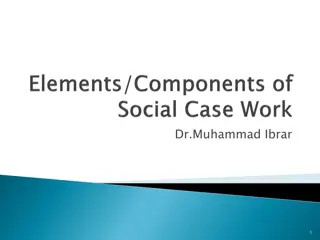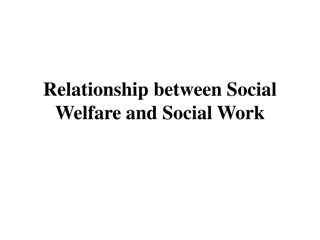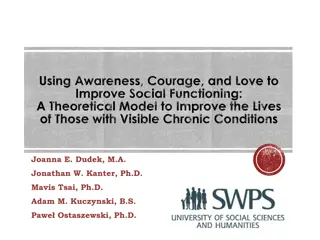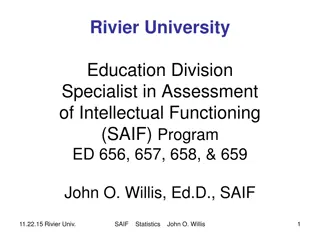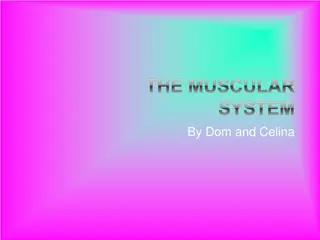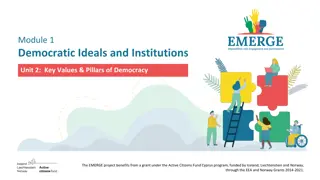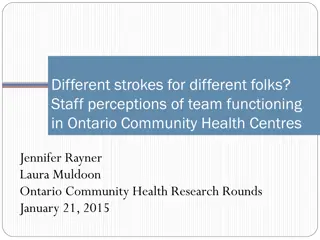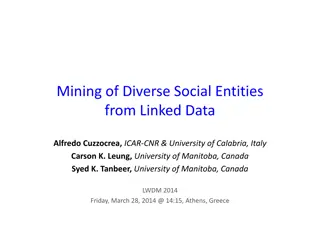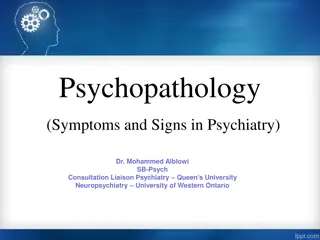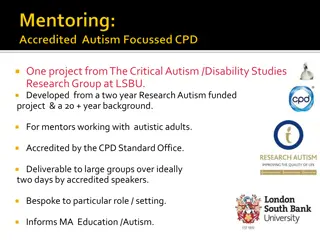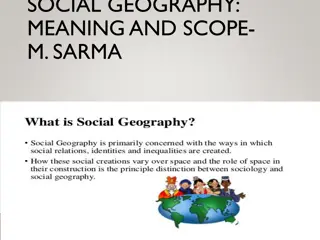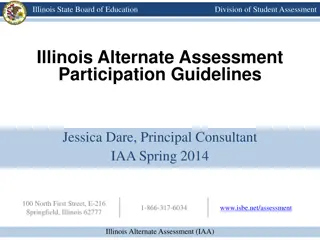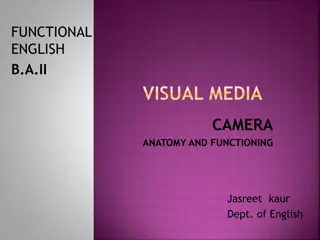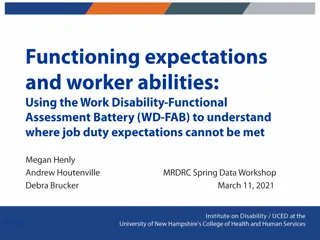Understanding Social Entrepreneurship, Social Enterprise, and Social Innovation
Social entrepreneurship involves creating sustainable social impact, social enterprises address challenges in critical needs sectors, and social innovation focuses on developing effective solutions to social and environmental issues. These concepts emphasize creating social value while engaging with
2 views • 19 slides
Understanding Psychosocial Theory in Social Work Practice
Social work practice has always integrated psychosocial concepts to address human well-being and social functioning. Psychosocial caseworkers aim to help clients navigate challenges stemming from environmental imbalances. The term "psychosocial" refers to the interaction of psychological and societa
0 views • 27 slides
Developmental Disability Eligibility Reform Amendment Act of 2022 Overview
The Developmental Disability Eligibility Reform Amendment Act of 2022 introduces new definitions, eligibility criteria, and expands services for individuals with developmental disabilities. It defines intellectual disability, developmental disability, and introduces substantial functional limitation
3 views • 13 slides
Understanding the Basics of Memory Functioning
Memory is the mental ability to store, retain, and recall information through encoding, storage, and retrieval processes. It involves sensory, short-term, and long-term memory stages, with encoding encompassing semantic, acoustic, and visual aspects. The retrieval process involves locating and recov
0 views • 20 slides
Understanding the Importance of Social Skills for Mental Health Recovery
Social skills play a crucial role in how we communicate, interact, and form relationships with others. They are essential for personal, social, and professional success. Neglecting social skills can hinder mental health recovery, as they contribute to social recognition, acceptance, and building soc
2 views • 12 slides
Understanding Medical Social Work and Its Impact on Patient Well-being
Medical Social Work, also known as Health Care Social Work, plays a crucial role in addressing the social, physical, and psychological needs of patients. Through providing case work, after-care, and convalescence services, Medical Social Workers contribute to reducing hospital readmissions, preventi
0 views • 12 slides
Objectives and Importance of Social Legislation for Social Workers
Social legislation is inspired by the constitution and aims to remove discrimination, safeguard rights of vulnerable groups, and eradicate social evils. It plays a crucial role in social welfare by providing a legal basis for addressing societal issues, enhancing community well-being, and facilitati
0 views • 4 slides
Phases and Steps of Social Case Work Process
Social case work process involves three main phases: Social Study, Social Diagnosis, and Social Treatment. The Social Study phase focuses on acquiring facts about the client's situation, while Social Diagnosis involves the professional opinion of the case worker towards a solution. Social Treatment
0 views • 7 slides
Understanding Social Welfare and Related Concepts
Social welfare encompasses a nation's system of programs, benefits, and services designed to address social, economic, educational, and health needs essential for societal well-being. The functional perspective emphasizes individual interdependence and societal efficiency, while the descriptive view
1 views • 9 slides
Understanding Methods of Social Work
Methods of social work encompass various approaches aimed at enhancing social functioning and addressing problems in individuals and communities. These methods are categorized into primary and secondary methods, each serving different purposes in the field. Primary methods involve direct interaction
0 views • 20 slides
Understanding Social Case Work: Elements and Process
Social case work, as defined by H.H. Perlman, is a process used by human welfare agencies to assist individuals in coping with problems in social functioning. The fundamental elements include the person/client, problem, agency, process, and professional representative (social worker). The client, wh
0 views • 14 slides
Understanding the Relationship Between Social Welfare and Social Work
Social welfare and social work are interconnected concepts aimed at enhancing societal well-being. Social welfare refers to a nation's system of programs and services meeting essential needs, while social work involves professional activities supporting individuals and communities in achieving socia
0 views • 6 slides
Cognitive Stimulation Therapy in Post-Acute Care: A Pilot Study
Cognitive Stimulation Therapy (CST) is an evidence-based group intervention designed for individuals with mild to moderate cognitive impairment. It aims to enhance cognitive functioning through various activities such as executive functioning tasks, multi-sensory stimulation, and reminiscence work.
0 views • 9 slides
Comprehensive Approach to Enhancing Social Functioning in Visible Chronic Conditions
This theoretical model explores the impact of visible chronic differences (VCDs) on individuals, emphasizing stigmatization and societal norms. It discusses the importance of social connection, highlights risks associated with VCDs, and presents the benefits of Functional Analytic Psychotherapy (FAP
0 views • 23 slides
Social Economy and Innovation in Emilia-Romagna Region
Emilia-Romagna Region in Italy highlights the importance of social economy and innovation for sustainable development. Various initiatives such as Social Cooperatives and Voluntary Associations contribute to the region's social well-being. The focus on social values and not-for-profit activities dri
1 views • 15 slides
Understanding Social Skills Development in Students
Explore the reasons behind students lacking social skills in school settings and analyze the challenges some face even after receiving social skills instruction. Discover the key social skills required for appropriate interactions and the importance of social competence for overall well-being. Delve
0 views • 64 slides
Understanding Social Anxiety and Avoidant Behaviors
Social anxiety involves intense fear and avoidance of social situations, leading to catastrophic thinking and physiological reactions like performance anxiety. Individuals may anticipate criticism, rejection, or embarrassment, which can interfere with their functioning. This condition can manifest a
3 views • 30 slides
SAIF Program at Rivier University: Assessment of Intellectual Functioning
Rivier University's Education Division offers the Specialist in Assessment of Intellectual Functioning (SAIF) Program led by John O. Willis, Ed.D. The program involves courses ED.656, .657, .658, and .659 focusing on statistics, test scores, measurement, and psychometrics. Resources from experts lik
0 views • 92 slides
Understanding Voluntary Manslaughter and Diminished Responsibility in Criminal Law
Voluntary manslaughter is a legal concept where certain special defenses can reduce a murder charge to manslaughter, giving judges discretion in sentencing. Diminished responsibility, introduced by the Homicide Act, allows individuals suffering from abnormal mental functioning during a killing to ha
0 views • 23 slides
Understanding America Study: Cognitive Functioning Measures
The Understanding America Study (UAS) focuses on developing web-based cognitive functioning measures, including tests for fluid abilities, verbal skills, executive function, and processing speed. Utilizing data from about 9,000 panelists, tests like the Stop and Go Switch task are administered onlin
0 views • 26 slides
Understanding Executive Functioning and Executive Dysfunction
Executive Functioning is a key aspect of cognitive function, encompassing various abilities such as planning, self-awareness, and emotion regulation. Executive Dysfunction, often resulting from frontal lobe injuries, can lead to difficulties in decision-making, social interactions, and learning. Thi
1 views • 21 slides
Understanding the Muscular System: Functions & Importance
Muscles are essential for movement, posture, circulation, and digestion in the human body. Without a properly functioning muscular system, vital processes like breathing and food digestion would be compromised. Maintaining muscle health through exercise and a nutritious diet is crucial to ensure opt
0 views • 11 slides
Institutional Framework and Antitrust Law in the EU
The European Union's institutional framework is defined by the Treaties of Lisbon, European Union, and Functioning of European Union. These treaties establish the EU's objectives, governance principles, and delineate competences. Additionally, EU antitrust law principles are based on the Treaties of
0 views • 16 slides
Understanding Neurodevelopmental Disorders in Childhood and Adolescence
Neurodevelopmental disorders in childhood and adolescence encompass a range of conditions including intellectual disabilities, communication disorders, autism spectrum disorder, and attention deficit/hyperactivity disorder. These disorders impact cognitive development, adaptive functioning, and comm
0 views • 30 slides
Understanding the Principles of a Functioning Democracy
A functioning democracy is built on principles such as the ultimate authority of the people, essential rights like freedom of expression, adherence to human rights, and the government's legitimacy from the electorate. Principles like accountability, freedom of assembly, and the separation of powers
0 views • 20 slides
Understanding Social Neuroscience: Exploring Human Sociality and Well-Being
Social neuroscience delves into how the brain processes social interactions and their impact on human well-being. It focuses on the interconnectedness between social connections and overall life satisfaction, suggesting that humans are inherently social beings with a strong need for social belonging
2 views • 21 slides
Social Entrepreneurship and Social Inclusion in Bulgaria
The development and implementation of social entrepreneurship practices in Bulgaria aim to promote social inclusion through the development of the social economy. The focus is on combining economic results with social objectives, managed transparently with measurable, positive financial value. Vario
2 views • 12 slides
Analysis of Disability Data Using U.S. National Health Interview Survey
The U.S. National Health Interview Survey (NHIS) conducts an annual cross-sectional household survey to collect data on various health aspects, including disability. The Functioning and Disability module within NHIS includes a set of questions to assess difficulties in areas such as vision, hearing,
0 views • 49 slides
Enhancing Team Functioning in Ontario Community Health Centers
Explore the importance of team function in Ontario Community Health Centers (CHCs) and how it impacts quality of care delivery and innovation in primary care. Understand the dynamics of inter-professional teamwork, the multi-faceted concept of team function, and the potential for interventions to im
0 views • 35 slides
Diverse Social Entities Mining from Linked Data in Social Networks
This research focuses on mining diverse social entities from linked data in social networks using a DF-tree structure and DF-growth mining algorithm. The study explores the extraction of important linked data in social networks and the mining of various social entities such as friends. Prominence va
0 views • 13 slides
Understanding Psychopathology: Symptoms and Signs in Psychiatry
Psychopathology involves the study of symptoms and signs in psychiatry, where signs are objective observations and symptoms are subjective experiences. Mental disorders encompass a range of issues affecting thoughts, emotions, behaviors, and relationships. Recognizing signs and symptoms such as slee
0 views • 31 slides
Overview of Classification of Psychiatric Disorders
Psychiatric disorders are illnesses with various manifestations that impact functioning due to disturbances in biological, social, genetic, and other factors. Two key classification systems, ICD-10 and DSM-5, categorize over 200 types of psychiatric illnesses. The ICD-10 includes categories like org
0 views • 18 slides
Understanding Autism & Disability: Mentor Training and Executive Functioning
This project from The Critical Autism/Disability Studies Research Group at LSBU focuses on mentor training for working with autistic adults, emphasizing goal-setting, action prioritization, time management, and social interactions. It explores concepts like executive functioning, individuality stren
0 views • 15 slides
Understanding Social Geography: Meaning, Scope, and Differences
Social geography is a branch of human geography focusing on social structures, groups, and activities. It examines the spatial arrangement of social phenomena, social differences, and patterns in understanding socially defined population groups. The scope of social geography includes analyzing spati
0 views • 25 slides
Illinois Alternate Assessment Participation Guidelines
The Illinois State Board of Education's Division of Student Assessment provides guidelines for participation in the Illinois Alternate Assessment (IAA). Students with significant cognitive disabilities, typically with intellectual functioning below average and impairments in adaptive functioning, ar
0 views • 9 slides
Detecting and Predicting Differential Item Functioning Using the MIMIC Model
Explore how the Multiple Indicators Multiple Causes (MIMIC) model can be applied to detect and predict potential biases in assessments, particularly between genders. Research questions include investigating attitudinal factors that may influence differential item functioning. The model incorporates
0 views • 13 slides
Exploring the Relationship Between Reflective Functioning, Interoception, and Art Experience in Undergraduates
This study proposal aims to investigate the correlations between Reflective Functioning (RF), interoception, and art experience among undergraduates. Through exploring how RF and interoception are linked to affect regulation, emotion, and the sense of self, the study seeks to shed light on the role
0 views • 22 slides
Understanding Visual Media: Camera Anatomy and Functioning in English Department
Dive into the realm of visual storytelling through the lens of a camera in the field of English with a focus on the anatomy and functioning of cameras. Explore the imperative role of visual thinking for scriptwriters, the evolution of video cameras, electronic news gathering techniques, working prin
0 views • 15 slides
Symptomatic Control of Functioning Pancreatic NET
Pancreatic neuroendocrine tumors (panNETs) can be classified as functioning or non-functioning, with functioning tumors producing active hormones such as insulin, glucagon, gastrin, or VIP. Symptomatic control is crucial for managing these tumors, with diagnoses based on clinical syndromes and hormo
0 views • 19 slides
Functioning Assessment Tool Results for Job Duties
This content showcases the results of an instrument designed to assess functioning in 8 domains, focusing on specific job duties related to mobility, fine motor skills, self-regulation, communication, and emotions. The data includes categorized scores, employment statistics, and work disability perc
0 views • 8 slides

